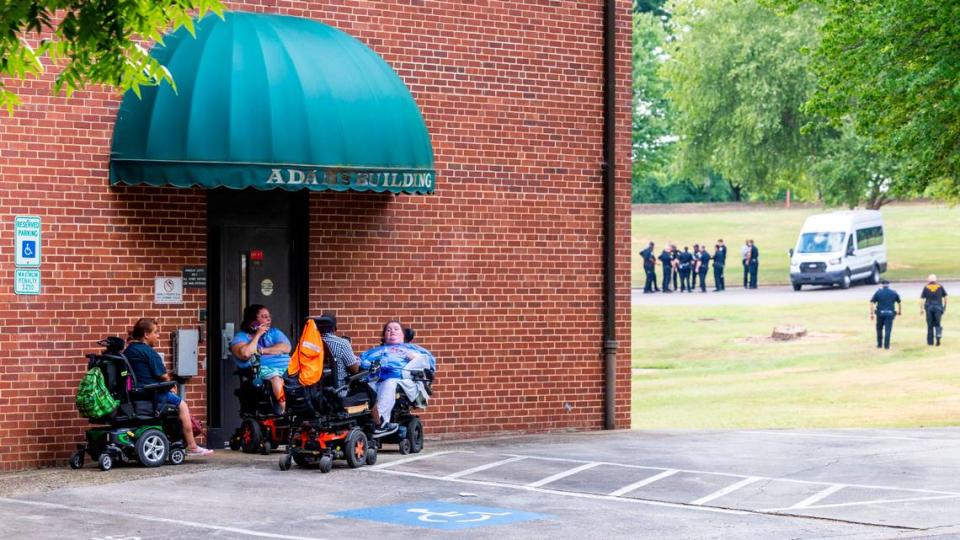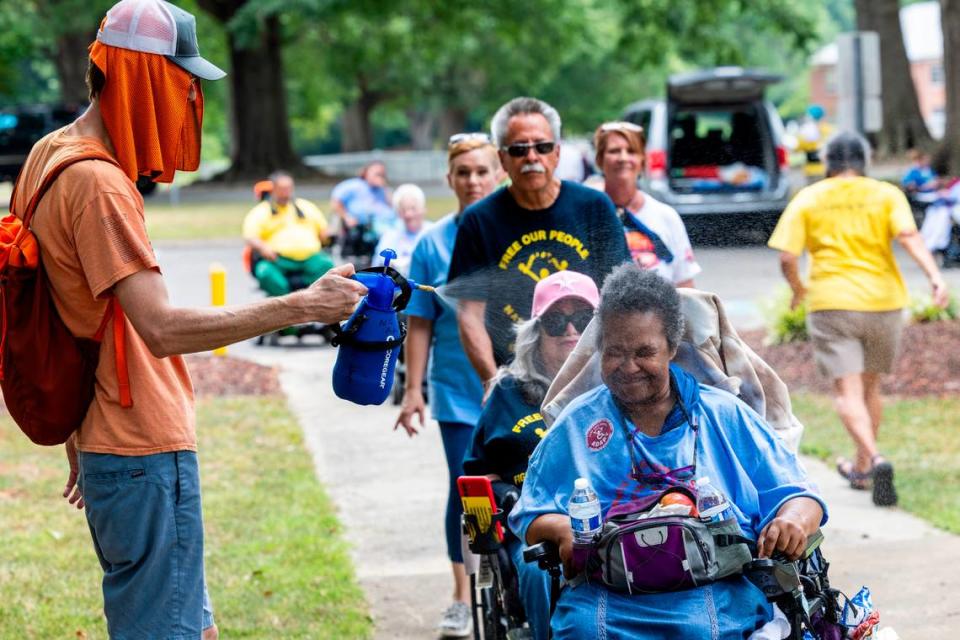Disability rights activists block DHHS doors during Raleigh protest, risking arrest
Activists for disability rights protested outside a state Department of Health and Human Services building most of Monday, even attempting to block exits at the end of the workday.
At about 3:30 p.m., protesters in wheelchairs moved outside each exit of DHHS’s Adams Building on the Dorothea Dix campus.
State Capitol Police officers escorted employees out of the Adams Building to their cars as protesters remained outside the exits. About 20 officers were on the scene by mid-afternoon, stationed at the doors and around the building, and threatening to arrest the protesters.
According to Chris Murphy, a disability rights activist who traveled from Minnesota, one able-bodied protester was arrested.
Rhoda Gibson, a wheelchair user from Boston, said she suspected more arrests would occur later in the afternoon once the police had a vehicle that was wheelchair accessible.
But after a couple of hours, the officers left their posts and gathered in a circle away from the advocates to talk together.
By 5:45 p.m., all officers and vehicles had left the scene. Protesters cheered as law enforcement left. The activists then dispersed at approximately 6 p.m.
Additional protests were anticipated for Tuesday. In an email sent Monday evening, all DHHS staff based in the Adams Building were told to shift to working remotely Tuesday.
Prepared to be arrested
Pam Auer, an activist from Pennsylvania, said State Capitol Police gave the individuals at the front of the building three warnings that if they did not move, they would be arrested and charged with kidnapping, false imprisonment and disorderly conduct.
Auer and Colleen Flanagan, another activist and wheelchair user, remained in front of the main entrance, saying they were prepared to be arrested.
“We are willing to do what it takes to bring attention to the issue because false imprisonment is what we live everyday,” Flanagan said.
Nicky Boyte blocked another one of the three entrances to the building in her wheelchair. Officers initially told her that she was going to be under arrest, but no action was taken.
Boyte is from Greensboro and is a member of the North Carolina chapter of ADAPT, a national grassroots disability rights group. The individuals at the protest came from across the United States to increase awareness of and support for accessibility.
The organization’s main goal is to end the “institutional bias in Medicaid that forces people with disabilities from their home and families into expensive institutions and nursing homes,” according to a leaflet that activists handed out at the protest.
Several activists chanted, “I’d rather go to jail than die in a nursing home,” outside the side entrance that Boyte was blocking as police officers stood nearby.
Boyte broke down in tears when the police left. Not of relief, she said, but because it made her feel less human.
“Do you know anyone else who blocks doors and doesn’t go to jail?” asked Boyte.
Protester demands
About 50 protesters with ADAPT had gathered outside the building earlier in the day Monday to commemorate the 25th anniversary of the U.S. Supreme Court’s Olmstead decision, which prohibited unnecessary segregation and institutionalization of people with disabilities and emphasized the right to receive services in their communities.
The group’s leaflet listed their demands for North Carolina, including equitable person-centered care delivered in homes and communities, affordable accessible housing for people with disabilities, support to live in integrated settings and increased state funding to serve people with disabilities.

“Community-based services are more cost effective and what people would choose if they had the chance, but North Carolina still has policies that prevent disabled Americans from living in the community,” the organization’s flier said.
But more than anything, they wanted to talk with North Carolina DHHS Secretary Kody Kinsley. According to Murphy, the activists began the protests at 11 a.m. and planned to remain there until they talked to Kinsley.
Murphy said representatives of the DHHS came out of the building to talk to the protesters and offered to bring a small group inside. But they declined the offer, instead asking for Kinsley to meet them outside. Boyte said North Carolina’s chapter of ADAPT had previously attempted to meet with Kinsley three times.
“He’s had plenty of chances to contact us and he doesn’t,” Boyte said.
A DHHS spokesperson said that the department offered the protesters an “opportunity to sit down with senior executives, out of the heat, and discuss their concerns, but that [offer] was not responded to.”
Mitigating the heat
The disability rights protesters remained outside as temperatures hit the upper 90s.
Joe Tate, who came from Austin, Texas, made rounds through the protesters with a personal mister, spraying them with cool water. As a personal care attendant, he said it was his duty to help the activists with disabilities get to the protest and remain safe.

Tate checked in with protesters multiple times throughout the demonstration, providing water and care.
“We’re OK, Joe’s taking good care of us,” Daniel Saenz, an activist from Austin, Texas, who uses a wheelchair, said.


